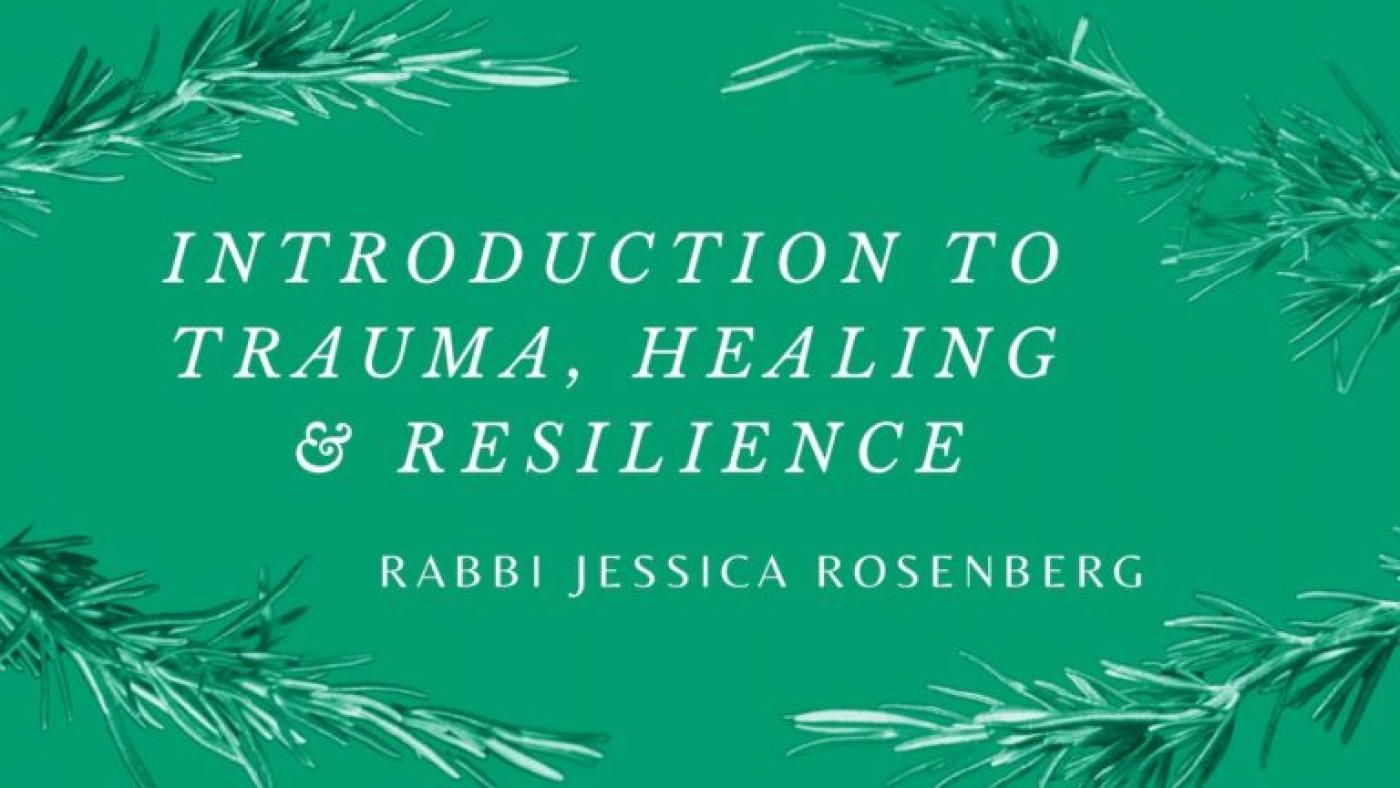by Rabbi Jessica Rosenberg
Originally published in eJewish Philanthropy on Aug. 11, 2020

I decided to go to the Reconstructionist Rabbinical College to learn more about trauma. I went to learn about my people, where we came from and what happened to us that impacted who and how we are. I became a rabbi so that I could potentially have something to offer us for moving towards where we might want to go. To be part of the processes we sometimes refer to as healing. To this end, I recently published “Introduction to Trauma, Healing & Resilience for Rabbis, Jewish Educators and Organizers.” This project of the Reconstructionist Rabbinical College was made possible by a generous grant from the E. Rhodes and Leona B. Carpenter Foundation.
Looking back to when I began rabbinical school, I more or less imagined that someone must already have figured out what healing historical trauma looks like and how to do it. There was a problem, and someone had the fix. My plan was to learn about healing historical trauma, learn about Jewish historical trauma, and then, you know, heal it. Ta-da.
This, you won’t be surprised to learn, did not work out according to plan.
There is a huge body of cross-discipline knowledge regarding trauma. Even when working with individuals, there are multiple methods and disciplines to facilitate moving through overwhelming, harmful experiences. People mean different things when they say “healing” and “resilience” and have very different ways of getting there, with a spectrum of attention to oppression, collective harm and systemic transformation. How do we actively integrate our values and visions, and address systemic harm in working with trauma?
I understand trauma as hurt that leaves a mark. This applies to individuals, who can experience overwhelming events and are shaped by the impacts of living in oppressive systems. Trauma can be experienced vicariously and can be passed down from one generation to the next. It can persist on collective, communal levels. Learning about collective and historical trauma is what pointed me towards rabbinical school and has guided much of my work now as a rabbi, including this trauma guide. As survivors of centuries of atrocities and oppression, Jews have accumulated collective traumas and systematic oppression in ways that shape Jewish self-perception, culture and politics.
I learned that, as much diversity as there is in the fields of working with individuals who’ve experienced harm, there’s just as much or more among people talking and thinking about intergenerational, collective, and historical trauma and healing. While there is deep and old wisdom to dive into and call on, no one has solved “healing historical traumas.” There are dynamic, evolving and emergent conversations happening in many rooms, weaving together political organizing, and health and wellness, cultural work and spiritual practices, farming and reconnection to land, language reclamation and reparations.
I haven’t found what I set out to: a singular, time-tested and concrete medicine for “healing historical traumas.” Rather, I have found something much better: an incredible wealth of relevant and powerful practices, conversations, questions; cross-discipline and emergent fields. I realized there was a role I could play: synthesizing some of this wide and deep work into frameworks and tools for rabbis’ and Jewish educators’ and organizers’ particular use. This is part of the process that resulted in the publication of this trauma guide.
This guide offers, I hope, valuable context, distillation of terms, tools, and most importantly, questions that rabbis and educators can ask to engage the ongoing process of integrating trauma awareness into our Jewish communities. What I’ve found in researching trauma, healing and resilience is that committing to continuing to ask questions is as important as the answers. Questions like:
- How does the congregation, group or class define safety?
- What experiences of being unsafe does the group, or individuals in the group, carry with them?
- What is the group already doing to create safety?
- For whom are these practices working, and whom do they leave out?
- What group norms, guidelines and boundaries can be established to reduce the possibility of harm? How will we respond when harm occurs?
We are living through extraordinary times, in which there is greater awareness than ever of the relationship between the present and the past. The past continues to live with us. As James Baldwin wrote, “Not everything that is faced can be changed. But nothing can be changed until it is faced.” Centuries of harm have been inflicted by antisemitism, racism, misogyny, trans and homophobia, ableism and more. Refusing to confront the individual and collective impacts of these centuries of, and ongoing, violence perpetuates and exacerbates those harms, in ways that we live with, every day, in our bodies, minds and spirits.
We have incredibly powerful medicine in our bodies, minds and spirits, and in the nuanced and diverse spiritual, cultural, ritual and historical gifts our ancestors passed on to us. We create healing in ourselves and our communities as we dive into our stories and our bodies, and hold space for grief and joy, pain and separation, care and connection. We create resilience when we do the lifelong work of tending to relationships, and our collective connections and spaces, the inevitable tear and repair of being human together. Our ancestors gifted us with the frameworks of teshuva, personal, collective, material and spiritual repair. The work is never done, and the gift is in the generative and ongoing journeying.
Rabbi Jessica Rosenberg, a 2018 graduate of the Reconstructionist Rabbinical College, is national organizer for Bend the Arc: Jewish Action. She is the author of “Introduction to Trauma, Healing & Resilience for Rabbis, Jewish Educators and Organizers.”





